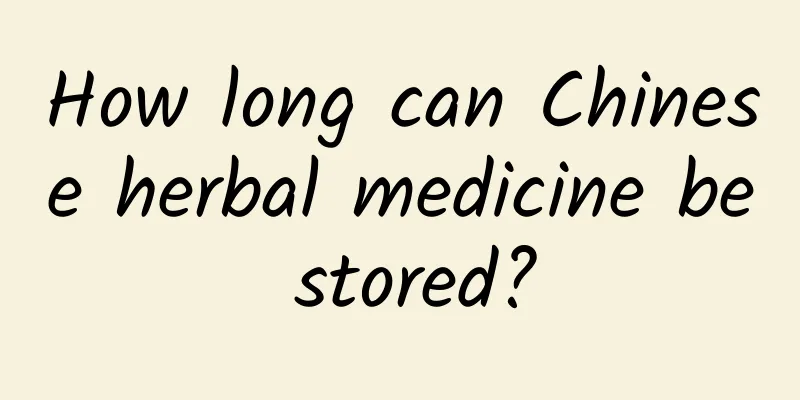How long can Chinese herbal medicine be stored?

|
Traditional Chinese medicine is a common way of treating diseases. Different types of traditional Chinese medicine are needed for different diseases and different requirements. In daily life, how long can Chinese medicinal materials be kept? What are the factors that cause Chinese medicinal materials to become moldy? What are the common mold conditions of Chinese medicinal materials? The editor will explain them one by one for everyone. How long can Chinese herbal medicines be stored? 1. How long can the decocted Chinese medicinal materials be kept? At present, the most common packaging for decocted Chinese medicine decoctions is vacuum-sealed packaging, followed by containers provided by the patients themselves. Studies have found that the higher the temperature, the faster the medicine will mold. In seasons with higher average temperatures, when the indoor temperature is above 25°C, the medicine is generally stored for no more than 2 days. If it is frozen, it is generally not easy to mold after being stored for 7 days. In addition, even under the same standard, different prescriptions have very different degrees of mildew. If the medicine contains more ingredients such as starch, protein, and glycogen, it will mildew faster. In order to ensure the safety of drug use, the best storage temperature of Chinese herbal medicines in sealed vacuum-packed bags is 0-5°C, and the storage time is 7-14 days, but it is best not to exceed 7 days. On the one hand, after the decoction is cooked, it is often stored at room temperature for half a day to a day before being taken home and frozen, which will "accelerate" the mildew of the decoction; on the other hand, if the decocted decoction contains animal-based Chinese medicinal materials such as whole insects and centipedes, or Chinese medicinal materials with high sugar content such as cooked rehmannia and scutellaria, it will also affect the storage time. If you find that the medicine bag is bulging or the medicine tastes different, or has bubbles or other abnormal conditions, it is moldy and cannot be taken. 2. How long can dried Chinese medicinal materials be stored? According to modern pharmaceutical research methods, anthraquinone glycoside compounds in Coptis chinensis are the main components that fully exert its laxative effect. However, with the increase of storage time, anthraquinone glycoside compounds will gradually be hydrolyzed into anthraquinone aglycones, and the laxative effect will gradually weaken. If Chinese medicinal materials are stored for too long, their ingredients will be lost, so their medicinal power will be significantly reduced. Chinese medicinal materials often experience some mutations during the storage process, such as being easily bitten by insects, mold, rot, discoloration and taste change, etc. Therefore, Chinese medicinal materials have a shelf life, and the longer they are stored, the better the effect will be. Those containing volatile oils, lactones, and even anthocyanins, which are prone to insect infestation, generally require a shelf life of about one year. The chemical structure of iron ore drugs is relatively stable and the storage time is relatively long, but it should not exceed ten years. If insects or mold occur, the efficacy of Chinese medicinal materials will be affected. It is recommended to place Chinese medicinal materials in a ventilated and dry place. Factors causing mildew in Chinese medicinal materials temperature Chinese medicinal materials have a certain tolerance range in terms of temperature. Temperatures that are too high or too low will cause changes in the quality of Chinese medicinal materials. When the temperature is above 35 degrees, medicines containing fat will separate the oil due to heat, thus reducing the oil content; medicines containing more volatile oils will also lose their fragrance due to heat; animal and plant gums and some epoxy drugs tend to become soft, stick together or melt when heated. When the temperature is between 20 and 35 degrees, it is conducive to the reproduction of pests, diseases, and molds, which can cause some medicines to grow insects and mold and even mildew. Ambient humidity Ambient humidity refers to the level of water vapor in the air, that is, the dampness level of the air. Whether the medicine itself can maintain normal moisture content is closely related to the humidity of the air. The normal moisture content of general medicines is about 10~20%. If there is a lot of water vapor in the air, the medicine will absorb a lot of water and increase the moisture content (moisture), which is easy to cause mold and mildew. gas Gas contains various components, among which CO2 is most likely to react with some components of medicines and affect quality. The darkening of the color of Cortex Moutan and Morinda officinalis that we usually see is due to the changes in the tannins, oils and sugars they contain when they come into contact with CO2 in the air. Common mildew situation of Chinese herbal medicines get mouldy That is, mold growth, which is the condition in which mold grows on or inside the Chinese medicine. Deterioration It is also called fermentation, which means that the Chinese medicinal materials are fermented, tasted, and discolored after being exposed to direct sunlight or high temperature, and lose their medicinal value. evaporation It means that the volatile oil contained in the medicine is lost or oily when exposed to high temperature; after the alcohol evaporates, the alcohol extract precipitates, resulting in the loss of ingredients. Turbidity Settling It is a common mildew condition for liquid Chinese medicinal materials. Liquid Chinese medicine preparations in Chinese medicine prescriptions are very prone to precipitation or mildew under ultra-low temperature conditions. Conclusion: Chinese medicinal materials also have their own shelf life. If they become moldy, no matter how expensive they are, they are not suitable for continued use to avoid causing greater harm to the human body. The storage time of Chinese medicinal materials varies according to their types and shapes. The main factors that affect the mildew of Chinese medicinal materials are temperature, humidity and air. |
<<: How long does it take to boil Chinese medicine?
>>: How long does it take to remove the needles in acupuncture?
Recommend
What does red scraping mean?
People who often do scraping should know that aft...
What are the symptoms of excavated folliculitis
I don’t know what’s wrong with my husband recentl...
What are the symptoms of varicose cord?
Varicose cord is divided into three grades accord...
What are the formulas and effects of wolfberry tea for clearing liver and improving eyesight?
Wolfberry tea is known as a good product for clea...
Where is moxibustion most effective for fatty liver
Moxibustion is a method of traditional Chinese me...
What is the reason for the white horizontal line in the middle of the child's nails
If white horizontal lines appear in the middle of...
What to drink for pharyngitis? What tea is effective for pharyngitis?
Chronic pharyngitis is a disease that makes the t...
Taking a deep breath makes you want to cough
Sometimes you feel like coughing after taking a d...
What to do with spinal curvature, 5 ways to get quick results!
Spinal curvature refers to the bending of one or ...
What causes numbness in the feet?
Numbness of the feet is mainly a kind of numbness...
Purple flower bitter vegetable for treating cholecystitis
Dandelion is a common wild vegetable in the north...
Effects of Chinese medicine Pueraria lobata
Pueraria lobata is a relatively common Chinese me...
How to remove the dark belly button after childbirth
For many new mothers, they will find that their b...
How to eliminate chicken curry
Many people don’t know what neck curry chicken is...
Prostate care
The prostate is an important component of the rep...









